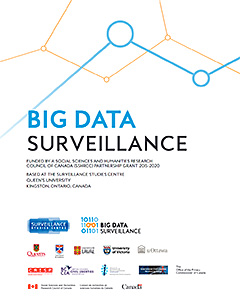
 Funded through a SSHRC Partnership Grant, ‘The Big Data Surveillance’ project examines the relationship between big data and surveillance in three linked streams: security, marketing, and governance. This project focuses mainly on the vulnerabilities generated by big data surveillance. In all three streams the collection of big data and computation capacities tilt surveillance towards predicting outcomes and intervening to shape behaviours in advance. While big data is often celebrated as offering new advantages for surveillance it also presents critical intellectual and policy opportunities for assessing the social, political and ethical issues it presents.
Funded through a SSHRC Partnership Grant, ‘The Big Data Surveillance’ project examines the relationship between big data and surveillance in three linked streams: security, marketing, and governance. This project focuses mainly on the vulnerabilities generated by big data surveillance. In all three streams the collection of big data and computation capacities tilt surveillance towards predicting outcomes and intervening to shape behaviours in advance. While big data is often celebrated as offering new advantages for surveillance it also presents critical intellectual and policy opportunities for assessing the social, political and ethical issues it presents.
In the world of big data surveillance, huge amounts of data are sucked into systems that store, combine and analyze them, to create patterns and reveal trends that can be used for marketing, and, as we know from former National Security Agency (NSA) contractor Edward Snowden’s revelations, for policing and security as well. This project views neither big data nor surveillance as ‘good’ or ‘bad,’ but nor are they neutral. Big data surveillance has consequences, opening opportunities and shutting them down. The once-limited leaks of personal data have rapidly become a torrent and opting-out is less and less possible.
Big data promises to further transform the ways that information and power are intertwined. Today, vast datasets of personal information are assembled and analyzed in unprecedented ways and novel domains. They prompt fresh queries about privacy, social sorting and civil liberties. Enthusiasm for big data techniques and practices has opened the door to mass surveillance as the main means of monitoring and tracking populations in order to manage and influence them.
The infrastructure and practices of big data raise new questions about the conduct and consequences of surveillance and intensify older ones. While stories about surveillance, online tracking and consumer profiling appear daily in the media, public understanding remains limited of why and how this persistent monitoring occurs. This research project builds on previous research achievements (‘The New Transparency: Surveillance and Social Sorting’ Major Collaborative Research Initiative (MCRI) 2008-2015) and work on today’s key surveillance trends to highlight some big data vulnerabilities.
Big data extends the scope of surveillance by co-opting individuals into participating in the surveillance of their own private lives. The ethical questions, political concerns and moral challenges arising from the use of big data techniques protrude well beyond data protection and privacy rights. They penetrate the core of modern democratic principles. Basic accountability and political responsiveness, essential openness and transparency, social justice and procedural fairness are all evoked as corporate and administrative practices become more invisible, opaque, embedded in our everyday lives, interactions and decision-making.
Big data is a game-changer.
See the Big Data Surveillance booklet, explaining the work of the project to date.